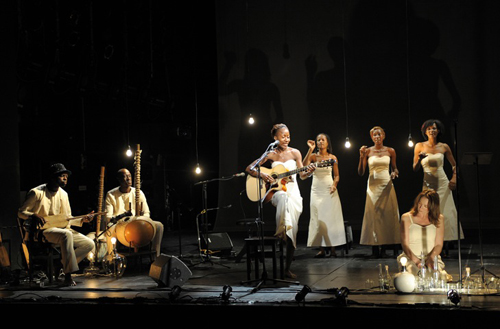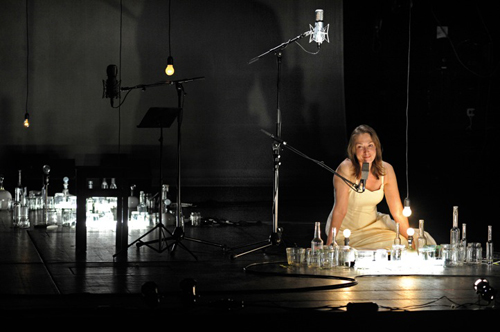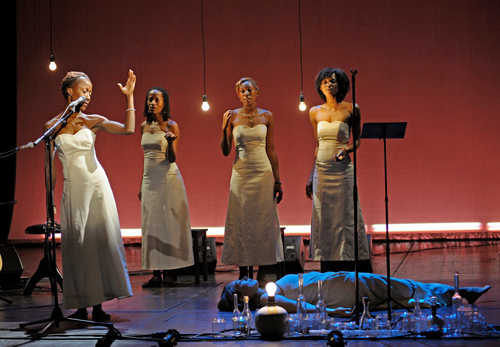- Accueil
- > L’Oeil du Spectateur
- > N°3 — Saison 2010-2011
- > Mise en scène de pièces de Shakespeare
- > Desdemona directed by Peter Sellars, Text by Toni Morrison, Music by Rokia Traoré
Desdemona directed by Peter Sellars, Text by Toni Morrison, Music by Rokia Traoré
29 May 2011, Koninklijke Vlaamse Schouwburg – Royal Flemish Theatre, Brussels
Par Charles Holdefer
Publication en ligne le 24 juin 2011
Texte intégral
1The premise is excellent: a chance to hear Desdemona’s side of the story from beyond the grave. How does she view her marriage now? And how does Emilia, who participated in the deception of her mistress, feel about her actions? And who, really, was Barbary, the maid mentioned fleetingly in Othello as the source of Desdemona’s “Willow Song”? We are told that she died of a broken heart while singing it. How does Desdemona know this? What kind of relationship did they share? Shakespeare doesn’t tell us the answers to such questions. Much is unknown about the female characters, just as much is unknown about the Moor.
2Desdemona tries to fill in the gaps. Directed by the indefatigable Peter Sellars, with a script by Toni Morrison and music by Rokia Traoré, this world premiere offers both a revision and extension of Shakespeare’s tragedy. Neither play nor concert, in the usual sense, it is a “literary and musical collaboration” which is informed by the traditional African notion of the ongoing presence of the dead. It appropriates the voices of Shakespeare’s characters and recasts the story for a 21st century audience.1
The Backstory
3The genesis of this project is interesting, even peculiar. In a brief introduction provided by Sellars before the performance, he described having a lunch one day with Toni Morrison and speaking frankly of Othello as a play he’d always disliked, because Desdemona was too simplistically good, and the racial politics were hopelessly archaic. In Sellars’ terms, the play was like a supermarket product that had been on the shelf too long: it had passed its “use by” date.2
4Morrison, to his surprise, disagreed, and challenged Sellars to direct a production of Othello that would explore such questions. The result was the 2009 New York show with high profile stars like Philip Seymour Hoffman as Iago, and John Ortiz in the lead. Reviews were generally unfriendly, sometimes hostile. (Regrettably, I didn’t see the production, which would’ve been interesting in regard to Sellars’ latest effort.) Much of the comment about his Othello concerned the deliberate blurring of the racial parameters set out in Shakespeare’s text, and the fact that the show ran almost four hours. According to Sellars, in his pre-show introduction of Desdemona, the atmosphere at the time was charged by the recent election of Barack Obama, with its endless discussions about whether the new president was “black” or “post-racial.”
5After Sellars’Othello closed, it was not the end his conversation with Toni Morrison. Intriguingly, they had also agreed that Morrison would collaborate with him and pursue the subject for an entirely new show of their own. For this idea, Sellars also brought in Rokia Traoré, an innovative Malian musician who had worked with him on his New Crowned Hope project. Morrison and Traoré spent nine months corresponding via Internet between the United States and Bamako, creating new material.
6Desdemona is the fruit of these efforts. Traoré performs her own music, often accompanied by two instrumentalists and a chorus of three women, while the actress Elizabeth Marvel interprets Morrison’s text, whose purpose and tone are neatly encapsulated in the opening lines:
My name is Desdemona. The word, Desdemona, means misery. It means ill fated. It means doomed. Perhaps my parents believed or imagined or knew my fortune at the moment of my birth. Perhaps being born a girl gave them all they needed to know of what my life would be like. That it would be subject to the whims of my elders and the control of men. Certainly that was the standard, no, the obligation of females in Venice in the fifteenth century. Men made the rules; women followed them. A step away was doom, indeed, and misery without relief. My parents, keenly aware and approving of that system, could anticipate the future of a girl child accurately.
They were wrong. They knew the system, but they did not know me.
I am not the meaning of a name I did not choose.3
 Rokia Traoré, center, with guitar, and Elizabeth Marvel, lower right.4 Photo © Ruth Walz
Rokia Traoré, center, with guitar, and Elizabeth Marvel, lower right.4 Photo © Ruth Walz
The Performance
7The result is a very worthwhile show that sometimes suffers from a conspicuous disparity between Traoré’s music, which is superb, and Morrison’s text which, despite interesting moments, is often less imaginative than worthy, and rather palpably pleased with its own didacticism. It has a message that stays on message and then, in case you didn’t get it, stays on message some more. (It is safe to say that the audience got it.)
8This situation puts Elizabeth Marvel, as Desdemona, in a difficult place. Sharing a stage with someone as formidable as Rokia Traoré – more about her later – while armed with only a mediocre script would be difficult enough. Tougher still is the fact that she has to do it on her own, without the added textures provided by instruments and a supporting chorus. It’s a lopsided arrangement which is apparent from the beginning, and which marks the entire show.
 Elizabeth Marvel as Desdemona. Photo © Ruth Walz
Elizabeth Marvel as Desdemona. Photo © Ruth Walz
9Marvel’s Desdemona is assertive, sure of herself, affirmative – there’s no mistaking her for a passive victim, a milksop. There are plenty of smiles, too, giving her a positively American toothiness even as she describes the indignities and injustices she endured at the hands of her parents and Venetian society. She basks in the consolation of knowing she was right. The values she espouses are sympathetic and very much of the 21st century. This anachronistic feel, in itself, is not a problem, since estrangement can be a good thing in a theatrical appropriation. More troubling, though, is her seeming invulnerability. It is impossible not to think of Sellars’ expressed dissatisfaction with the static purity of Shakespeare’s Desdemona, and feel that we have traded one goody two-shoes for another.
10So it’s a welcome development when the monologue shifts to recollections of other characters, for whom Marvel adopts different voices and attitudes. This allows for a measure of conflict, and it also allows Marvel to show her skills as she moves from individual to individual, with transitions occasionally reinforced by her interaction with the set design, which features candles and hanging light bulbs. This design, by James F. Ingalls, is stripped-down but appealing, privileging the insubstantial qualities of light over material trappings.
11In the voice of Emilia, she reminds the spectators of the gulf in social status which separated her from Desdemona, and explains her deceit as a necessary survival tactic. “Women,” she observes, “must survive because they can’t flourish.” In the voice of Othello, she emphasizes the struggle of a black man to have his dignity recognized by Venetian society; she also recounts stories from his past, in a sequence that recalls Othello’s speech before the Senate in Act I of Shakespeare’s text, where he describes falling in love with Desdemona while telling her frightful stories. Here, Morrison fleshes out these stories, which include tales of terrible atrocities committed in his youth, told in a manner that invites comparisons to the plight of child soldiers in Africa today.
12The central conceit of Desdemona, though, concerns the heroine’s relationship with Barbary. In this rewriting, Barbary is presented as an African nurse who cared for Desdemona as a child and whose influence contributed to her falling in love with Othello. (The program notes assert that “Desdemona was raised by an African woman, growing up with African stories and learning African songs.”) In Shakespeare’s text, Barbary is actually the maid of Desdemona’s mother, and the only reference to her is in Act IV as the source of the “Willow Song.” Moreover, the word “Barbary” didn’t necessarily have the racial meaning ascribed to it here. (It more commonly referred to Berbers.) But, for the purposes of this production, an intimate, racially-configured relationship is assumed.
13Rokia Traoré provides the voice of Barbary – and, symbolically speaking, the voice of Africa. Often accompanying herself on guitar, she mixes griot tradition with other stylings and achieves impressive results. She is also assisted by instrumentalists Mamah Diabaté on the ngoni (a traditional West African lute) and Mamadyba Camara on the kora (a type of bridge harp). This combination of strings works very well and, with the added layer of the back up chorus (Naba Aminata Traoré, the sister of the lead; with Bintou Soumbounou and Fatim Koyaté), the music is rich without being overwrought.5
 Traoré, her back up chorus, and Marvel (reclining). Photo © Ruth Walz
Traoré, her back up chorus, and Marvel (reclining). Photo © Ruth Walz
14Traoré’s singing is both subtle and powerful, and expresses a broad palette of emotions. There is no sense of an artist straining for effect: the effect is there, which testifies to art of a very high order. It is often wonderful to witness. Traoré’s lyrics – for which I often depended on the French translation projected behind the stage – range from a convincingly anguished “Maintenant, je me sens perdue” to declarations of joy.
15Toward the end of the performance, Traoré as Barbary leaves off singing and engages in a spoken dialogue, in English, with Desdemona. In this conversation, she reveals that her name is not Barbary at all. Her true name is “Sa’ran,” which in West African tradition means joy. Thus the contrast with Desdemona (“misery”) could not be more complete, even if Sa’ran makes it clear that she has seen much misery herself, and that Desdemona, as a participant in a culture of systematic racial oppression, was one of the sources of her misery.
16Here Desdemona’s goodness is effectively challenged, and her characterization becomes more complex. (There was already a hint of this in an earlier conversation with Othello, where she concedes, “Your doubt and my righteousness ruined our love.”) In this case, the reproach comes from an entirely unexpected source. Sisterhood collides with race, and Desdemona must re-evaluate who she is.
17Still, reconciliation does appear possible. After a little dabbling with special effects in the form of white-light and a recorded voice-off (a miscalculation, in my estimation), the show concludes with an emphasis on “we.” The audience is told that “We will be judged by how well we love.” This might be a hopeful note. Or it might be exactly the opposite. Implicitly, it is up to us.
The Rub
18In his introduction before the performance, Sellars said, “Let the healing begin.” And this accurately sums up the guiding sentiment behind Desdemona. As sentiments go, it is unexceptionable. But is it drama?
19Healing is a process, and for it to occur, there must be hurt. Although in Desdemona there is plenty of hurt, most of it has already happened, and it is recollected, not enacted. This keeps the spectators at a distance.
20Part of the problem, too, is formal. Music and monologue share the same space, yes, and perhaps a unified moral purpose, but they do not merge into a dramatic wholeness. Traoré’s performance compensates for this gap by offering other pleasures. The monologue portions, however, are more circumscribed, and have less to offer. Marvel is a talented actress but there is only so much that she can do with this material. Occasionally in the story, and particularly toward the end, Desdemona’s righteousness gets challenged a little – but it is only that, a little. Her failing was ignorance and never, it seems, intention. Morrison’s script would have us believe that she never consciously committed a cruelty.
21This saps much of the potential energy and dramatic power out of the conclusion that “we will be judged by how well we love.” Offered a role model instead of a more deeply flawed human being, the audience is denied its own chance to love. Because that is exactly what it takes when faced with deeply flawed human beings. Instead, the audience is invited to cheer for the home team. When clapping becomes more important than feeling, something is missing.
22Still, Desdemona is an interesting rewriting of Shakespeare, and a symptom of our times. If it does not look too deeply into its own assumptions, it sounds and looks very good. It also attests to the power that Othello still exerts on the imagination.
Notes
1 THE CAST
Desdemona: Elizabeth Marvel
Barbary: Rokia Traoré
MUSICAL ACCOMPANIMENTNgoni: Mamah DiabatéKora: Mamadyba CamaraChorus: Naba Aminata Traoré, Bintou Soumbounou and Fatim Koyaté
THE CREW:
Lighting Design: James F. Ingalls
Sound: Alexis Giraud
Production: Diane J. Malecki
Production Stage Manager: Anne Dechêne
Assistant Stage Manager: Janet Y. Takami
2 For a promotional trailer by Sellars which includes a brief account of the genesis of Desdemona, click here: http://www.bozar.be/webpage_broadcastitem.php?broadc_id=1352&lng=nl
3 Toni Morrison, Desdemona, excerpt included in programme note: http://www.kvs.be/index2.php?page=program&discipline=1&vs_id=589&lng=ENG
4 Also pictured, from left: Mamah Diabaté on the ngoni, Mamadyba Camara on the kora, and the back up chorus: Naba Aminata Traoré, Bintou Soumbounou and Fatim Koyaté.
5 For a promotional trailer that includes brief excerpts of the music, click here: http://www.youtube.com/watch?v=aeWN71gokhU&feature=related